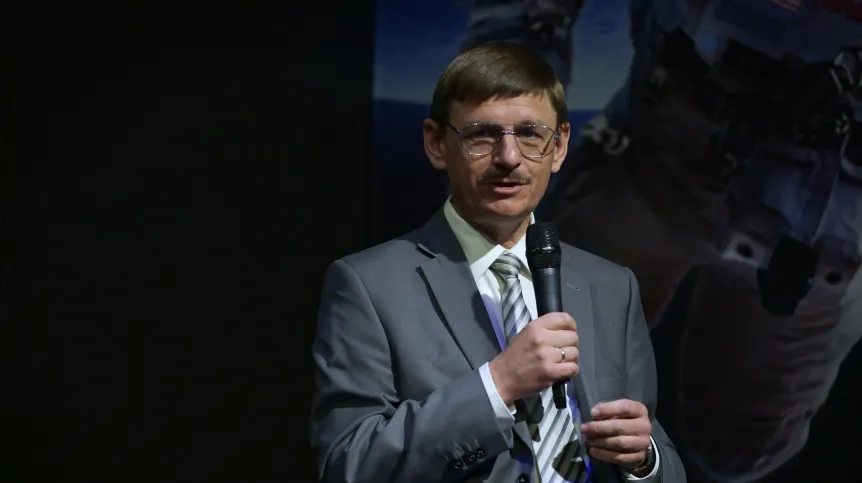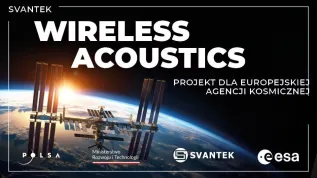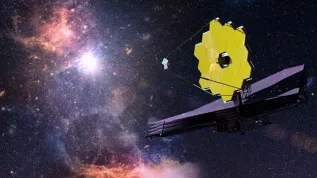
In October, the Polish Space Agency signed the Artemis Accords declaration. It is expected to open the way for Poland to participate in NASA programs, especially those related to the exploration of the Moon, Mars and other astronomical objects of the Solar System. Design work is already underway, for example on the lunar orbit space station Gateway.
Professor Grzegorz Wrochna, head of the Polish Space Agency, says this will bring Polish institutes and companies opportunities for supplying research instruments, including the equipment for studying the Moon and its surface
PAP: The Polish space industry and domestic research in this field began to fully develop only after Poland joined the European Space Agency (ESA). Could signing the Artemis Accords be of similar importance?
Professor Grzegorz Wrochna: It will definitely have a big impact on the Polish space sector. I am convinced of this, because it was Polish companies that pressured the Polish Space Agency to sign this agreement.
Of course, cooperation within ESA, joint projects, and the return of the contribution in the form of contracts for Polish companies are still very important to us. But the ambitions of Polish companies are growing. They want to take part in projects also outside of Europe, with other agencies, and of course NASA is very attractive in this regard, because it carries out many ambitious missions.
PAP: Today Polish companies mainly develop small components, such as sensors or smaller mechanical parts. Can we expect an evolution towards more complex systems?
G.W.: First of all, it is worth noting that Polish companies and institutes have already produced not only small components, but also entire research instruments, and we have nothing to be ashamed of in this area. This is also what cooperation on international missions looks like. Companies or institutes provide various types of components, especially research instruments. The development of instruments for measuring various physical parameters, detecting radiation or mechanical parts that, for example, would dig into a comet or drill into Mars, was a very responsible task. Some of them were commissioned by ESA from Poland because other countries would not be able to handle it. So we have reasons to be proud. It is a pity that we hear so little about it, but this is the specificity of space projects.
PAP: What does that mean?
G.W.: They take years of work to be developed, then there is the moment of culmination, after which scientists spend the next dozen or so years analysing the collected data in the silence of laboratories. The media are more interested in sensational discoveries, for example finding conditions favourable to life. I hope that we will hear more about the work of the sector's experts, because we will to not only build more equipment, but also increasingly larger subsystems and systems of space missions. Their goal will be to explore the cosmos, obtain information about the Moon and other objects in the Solar System or the far outer space.
PAP: Space projects are not only science and research, are they?
G.W.: The other side is the use of space, i.e. specific technologies - primarily telecommunications, satellite navigation, optical or radar Earth imaging, thanks to which we obtain information that is absolutely necessary in areas often not associated with space, such as agriculture.
I think that the strongest development of the Polish space sector will take place in the commercial use of space area. That is what we need today. The National Space Program, which we are now finalizing, is designed to satisfy the needs of a modern state and all of us with the help of the Polish industry, and not only by purchasing technology from abroad. We will develop both in directions, both research and cognition, and utility. This will allow to create a market for services related to space technologies. As a result, another rapidly developing, profitable branch of the economy will be created.
PAP: The Artemis program primarily concerns a return to the Moon and the Gateway station in its orbit. What will Poland be able to offer in this regard?
G.W.: Gateway is an important element, but there are also plans for permanent bases on the Moon that will be explored. Perhaps raw materials that are rare on Earth will be mined there. Gateway is also a staging point for missions to Mars, because it may be easier to assemble a spacecraft in orbit around the Moon, from parts supplied from Earth. It would be difficult to launch it from Earth in its entirety. There are many topics in the Artemis program in which Polish institutes and companies will have a chance to take part by supplying research instruments, for example equipment for research on the Moon's surface and in its vicinity, technical parts, but also software, which is also starting to become a Polish specialty in the space sector.
PAP: You mentioned the extraction of raw materials. Some say that there are huge resources of them in space, including the Moon. A group of engineers affiliated with AGH-UST says that Poland should invest in this area. How realistic is this idea?
G.W.: Until now, lunar, planetary and comet mining has been the subject of science fiction literature only. I have watched two films about Helium-3 mines on the Moon. But it may change in the near future, because technologies for launching payloads into space have become so much cheaper and rocket technology has become so widespread that not only large space agencies can afford it. Commercial companies are also capable of building rockets that can reach the Moon and bring something back. The Moon will be first, then the comets that will be near Earth. It will be possible to extract rare minerals from these objects. I think the first attempts will take place in the next 10 years, and regular work will begin in 20 years. The Artemis program will significantly accelerate this process.
PAP: Can we expect independent Polish missions, for example to the Moon or Mars?
G.W.: If you think about Mars, for example, you will notice that the missions so far have mainly served to satisfy our ambitions, show that 'we are already there'. Their scientific or economic value was rather small, although they have certainly helped to develop new technologies. I think that we can think about going a step further and plan more ambitiously so that our participation in the mission to Mars brings great scientific benefits. We can achieve this thanks to international cooperation and that takes us back to Artemis Accords.
PAP: And what about the Moon?
G.W.: When it comes to the Moon, we don't have to build the rocket ourselves, we can use the offer of NASA or commercial companies. It will be relatively easy to prepare a mission that will fly to the Moon on a ship operated by another country or private entity, while the payload and equipment could be manufactured entirely in Poland. I think something like this could happen in 10 years.
PAP: Space research, projects and missions require personnel. We already have the first space studies, will there be more? Will signing the Accords be another stimulus for their creation?
G.W.: We already have such courses indeed and the Polish Space Agency is helping to open them up and run them at universities. Some are dedicated courses, some are a bit more general, for example related to aviation. Young people are eager to choose them because they have broader prospects. At the same time, the staffing barrier is often named as an obstacle to the development of the space industry. On the other hand, the interest in space among young people is huge and it will certainly be necessary to create more courses, both dedicated and combined ones. The main goal is to educate engineers, but we also need experts in various other fields, such as biologists, physicians, managers, financiers and lawyers. In addition to new full-time courses, we can expect the opening of postgraduate studies or additional courses that will help graduates find jobs in the space industry.
PAP: We have talked mainly about business. How else will state institutes and universities benefit from Artemis Accords?
G.W.: The benefits are mutual, for both science and business. We cooperate internationally in the construction of complex scientific equipment. If Polish scientists want to use it, Poland must contribute to its construction, either financially or in kind. With a financial contribution, the money returns in the form of orders. In the case of contribution in kind, we produce equipment components. I think this will be our model of cooperation with NASA. Scientists will gain new research opportunities and will contribute to the development of this equipment themselves. As a result, Polish companies will win contracts for new technologies, from which they will be able to profit, and at the same time gain excellent references. Participation in a space mission is worth more to a company than any award.
PAP: Will the Accords also mean greater opportunities for foreign travel for scientists and students? And will it actually be beneficial? Will more of them not leave the country?
G.W.: When such cooperation is established, scientists are naturally included. We are also working on opening up new opportunities for students. In fact, they already exist, there are only various, minor formal obstacles. We are working on opening these channels, also in the direction of cooperation with NASA and JPL. We should not be afraid of brain drain. For example, China is building its economic power thanks to the Chinese who left for the US or Europe, learned a lot and came back because the country created favourable conditions for them. Poland already is a very good country to live and work. More and more scientists from abroad come to work in Poland, and more and more companies set up their branches here. I think that we will increasingly observe what I have experienced myself. After seven years of work at CERN, I returned to Poland and I am now pursuing my career here. I think that more young people will now follow a similar path, thanks to collaboration with ESA or NASA. They will bring back knowledge and contacts to Poland. (PAP)
author: Marek Matacz
mat/ ekr/ kap/
tr. RL













